|
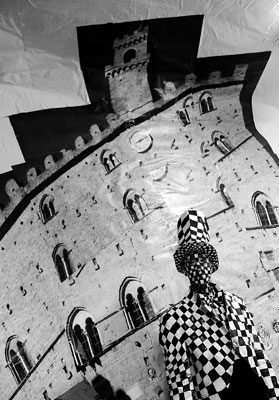 Etymologically
- but not only - "Prison" is a place where to be
contained close to repress, force, force (similar to coerceo,
coercion). Usually the imagination ranges from dark and damp
dungeons seen in films set in the Middle Ages, until
technological architecture par excellence, able to classify and
re-shape the minds of individuals defective machine supermodern
akin to Jeremy Bentham's panopticon, which with its structure
constrictive but transparent, perfectly ordered and hierarchical
("organizable and 'tree'," as they say in computer
science) was a metaphor for Michel Foucault's example of
modernity. The architecture of the fortress of Volterra, as well
as other Italian prisons, combines these two images into one
impressive. The actual operation of that prison, tax forms to the
life that flowed there, were among the most frightening of Italy:
in prison in Italy on major survey curated by Aldo Ricci and
Giulio Salierno in 1971 it was portrayed as a place of torture
not unlike the classic image of hell. Twenty-three years this
model has been inexorably eroded by the laboratory of drama
within the fortress: a work which, if it looks good, has begun to
corrode the architecture, where the bars were sawn to open doors
and gates. Etymologically
- but not only - "Prison" is a place where to be
contained close to repress, force, force (similar to coerceo,
coercion). Usually the imagination ranges from dark and damp
dungeons seen in films set in the Middle Ages, until
technological architecture par excellence, able to classify and
re-shape the minds of individuals defective machine supermodern
akin to Jeremy Bentham's panopticon, which with its structure
constrictive but transparent, perfectly ordered and hierarchical
("organizable and 'tree'," as they say in computer
science) was a metaphor for Michel Foucault's example of
modernity. The architecture of the fortress of Volterra, as well
as other Italian prisons, combines these two images into one
impressive. The actual operation of that prison, tax forms to the
life that flowed there, were among the most frightening of Italy:
in prison in Italy on major survey curated by Aldo Ricci and
Giulio Salierno in 1971 it was portrayed as a place of torture
not unlike the classic image of hell. Twenty-three years this
model has been inexorably eroded by the laboratory of drama
within the fortress: a work which, if it looks good, has begun to
corrode the architecture, where the bars were sawn to open doors
and gates.
But what has been done this year has even more the
flavor of the extraordinary. The organizers of Volterrateatro,
both to respond to economic shocks cuts, following a precise and
poetic, they carried the full traditional theater festival in
late July in prison. Besides the meeting with the staging of the
work of the Society - which this year was called Mercutio does
not want to die - inside the prison in three days took place (if
I counted them all) 19 different performances, installations and
lectures plus some . If the prison can not be open to the city,
therefore, has managed to bring here - literally - in the city
jail. And the setting in prison has enriched the shows presented.
Instead of being just a place to hide, to remove the eye, all
that is revealed as human material can be transformed into
wealth. The crowd outside was assigned to a course, paid a
voluntary quota for the organization (no ticket was not paid in),
and then the front door of the prison all began, with the call of
music and entertainment company. Inside
were ten theatrical spaces (three inside, the other made in
sections separated by a courtyard cages) to host the
performances, some of which took place in parallel and between
which the public were sorted from three to nine in the evening.
Bleachers, chairs, stage, wireless
microphones, mixers, sound systems, lighting, accessories, voice,
movement and music filled the spaces.
For
years, critics, commentators, spectators, with people who have
not even seen the shows, dispute about the value or lack thereof,
of the work of Armando Punzo and his company. On the one hand,
the supporters, who seek to understand the show and the theater
(including those with less support also work). On the other
detractors, who accuse (or at least suspect) the director to take
advantage of a situation of "easy" (as the term seems
strange) media coverage to impose on others their own aesthetics
and make it the key to its success and its histrionics. Perhaps,
at this point, it would be fair to overcome the limited aesthetic
disputes, including those who are fascinated by these shows
unusual ability and who not to attend staged often not available
to the public to speak out occasionally, and tell a story ordered
with a beginning, a middle and an end. Instead of judging a show
based on his adherence to our aesthetic, I think that it is time
to try to look a little 'further, pointing out that the theater
is not limited to the show for the public, and even (the one in
jail ) can only be "re-education".
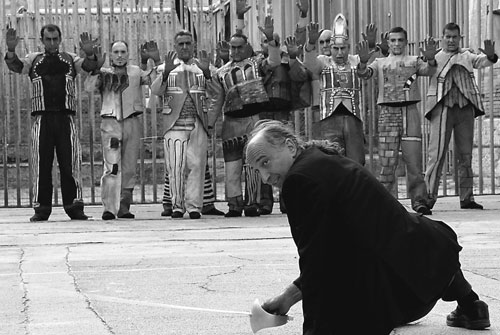
 Difficult shows
Difficult shows
Would be the time that commentators asked how
would the jail of Volterra if the theater had never been. The
answer seems obvious: it would be a prison like everyone else,
maybe a little 'worse. And then you should shop around and ask
this prison as it is now, now that is the theater. It is a
prison, while remaining prison - and to the extent that this is a
collection of forms and practices of violence, aimed at isolating
and making communication impossible, and therefore the life and
change - has managed to transform itself to three days in a space
that can accommodate the movement and freedom necessary for the
unfolding of a theater festival, with about three hundred
visitors per day from outside, in addition to the organizers,
members and technicians of other companies.
At the end of the
performance of the Company, Armando makes a speech to explain to
viewers what is the meaning, direction, the goal of what they
just saw. It does not define this year's production a "show",
but reduces it to "sketch". For three years the "show",
understood as a linear narrative enjoyable front by a privileged
point of view (just the much-disputed "Italian theater"),
is not allowed in public view within the prison. Not that this is
something that is not reflected or by chance: the content is
there and as deep as ever. The Mercutio does not want to die
reinterprets Shakespeare's Romeo and Juliet by focusing not on
the love of two teenagers, but on another kind of love that
commonly goes by the name of poetry. The first is a love that
obscures the view, and that generates death (one of the two
protagonists and many other unfortunate), the second is an
aspiration generative never completed, which here becomes an
allegory of the relationship between the city of Volterra and
poetry Theatre Company.
Not easy, but less than usual
initiatory and more enjoyable for those not familiar, the work of
this year keeps the form it had taken the previous two years: how
to Hamlice, the core of the drama is brought into fragmented into
the building and rooms in which words and actions take place in a
contemporary Cubist, so occasionally the viewer is forced to
choose a point of view through which to assist only a small part
of total events. This year, it insists on the need to find a
lightness, a Juliet played by a young dancer who cites the
sequence of the paper flower Pasolini, a prisoner-Chinese actor
who sings Eastern melodies with up face framed in a balcony in
Verona, the balloons Those taking the flight and depart scattered
over the sky of the Fortress, maybe even the ship that sails on
the waves painted in the theater. And most of all, children who
welcomed the audience out of the prison playing, dancing and
setting in motion a word of mouth. Children whose weight is
negated in prison, as becomes clear in the finale of the show
when each brings to the stage held the cardboard cutout of a
child holding a balloon to the wire: the children here can not
enter, and all that they are and represent, is excluded from this
world.
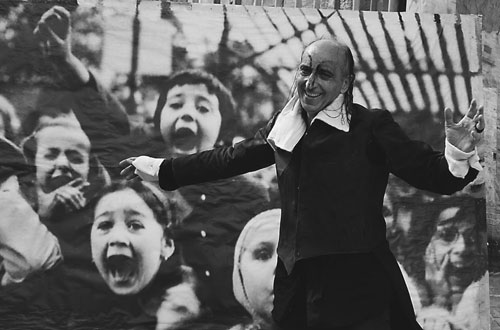
In any case, it is difficult performances, and
not everything is staged so as to be understood by those who
simply watch the show. This is not an error, but a choice. Can
understand something of what has happened to those who can not
imagine that there is no more, can not see if there was? The
renunciation of narrative, the show front, is the waiver order
things for the consumption of those who was not there, who is now
arrived when (forgive dall'Hamlice another quote) "It's
late." - Do you really want to hear more of the same old
story? - (Or something) this year asked the recorded voice of a
child. What I was told, has already been said. Repeat, it would
only let a cage - in those cages can be made of gold - in the
roles that built the structure can not be touched. Even if the
public would like another good show that calms the conscience -
seem to feel - we are not able to give it, no need to say more.
"We do not make that theater becomes another prison to
prison," Armando reflected in its short and densely packed
at the conference "A closed scenes," held at the Teatro
della Pergola in Florence in November 2008. Perhaps the most
sincere critical article on the phenomenon of theater wrote in
prison, having also lived near and inside, in 1998 Adriano Sofri
"Panorama": This evening we recite a subject. I quote a
fragment, but it would be worth re-reading in full: "The
prisoners have no rights and no voice in any chapter, so why cry
when they are closed, like animals in a zoo at sunset. In the
theater can say everything is [...] Subversive theater and
reassuring, because the subversion of the play takes time. It's
called the show on stage, you do it roar, then the reference
should be made in a cage and take the applause. [...]
The inmates themselves, perhaps, did not remember more than half
an hour later. You do not remember
most of those lives possible parts'.
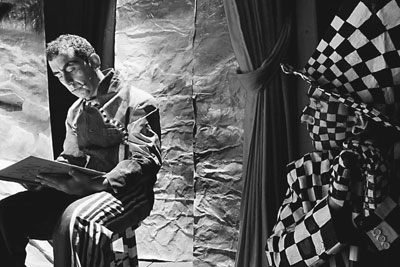
 The courtyard becomes
the square
The courtyard becomes
the square
It seems to me significant that the most
important theater company in prison in Italy, in the years that
now the phenomenon has exploded the prison-scene, you can not (or
refuses) a package normal "performance" - at least not
within the prison - where he summed up his experience to use and
occasional use of the viewer. But instead of stopping, surrender
or give up, unable to continue at the same time to revive the
sense of what to make of this "theater".
Starting
from a reflection on the relationship between the experience of
the Company and Fortress of Volterra, the initial idea had been
to a show that should take place not only inside the prison, but
also with various groups outside the city : the elderly,
children, ordinary citizens could cooperate in staging the show.
It was not possible, primarily for reasons relating to permits,
create a vision that involved a very dynamic relationship between
inside and out. So was the jail to become a city. Gates and doors
opening and closing continuously, previously unknown persons
entering and coming out with tools and materials for all
theatrical productions. A company goes through the gates of the
courtyard and greeted Armando, another company of five actors
Congolese passes and goes to settle in another area of the
courtyard, some held them looks surprised and then greets them.
Rhythms of djembe and other drums, and screaming voices recite
songs. Walls of the trenches on a group of percussionists (and
then trumpet) plays under the eyes (suspiciously? Surprised?
Curious?) Stewards. And the public in the afternoon, the
courtyard becomes a square, the poems recited in front of the
fountain, the theatrical spaces that come alive, groups of people
swarming.
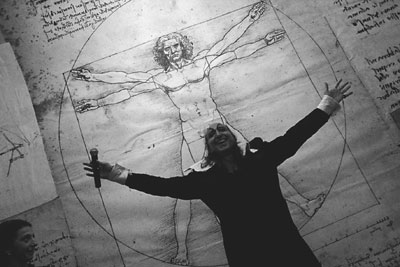
In his speech at the end of Mercutio does not
want to die, Armando declares that he needs a permanent theater
right there, to tell all this experience and what it means. To
tell what he and all the "friends" (in the order:
participants and non-participating inmates, prison staff and
agents, employees, citizens, supporters) have discovered in these
years of work. Remember that it is absurd to give up dreams,
without which no reality can be transformed. But perhaps they
have to say something more detailed, something that has to do
with the structure of the prison and its negation. The key lies
in the subtitle dell'Hamlice, "essay on the end of a
civilization", the show brought civilization to which an
alternative. I like to read this "end of civilization"
as the failure of the modern dream of progress based on a Reason
(reductionist) which operates by excluding what is different (and
therefore dangerous, as hostile to his project), in order to make
more perfect the world through his arbitrary simplification. One
reason that in the course of history was not suitable for their
operation. But in the show there was no apocalyptic tone, because
the end of that reason was a prelude to the blossoming of another
directive, based on the difficulty and complexity rather than
exclusion: the one that was in was called "the logic of the
theater. "
The idea that Reason has assumed in modern
form of "discipline" that Foucault had developed forty
years ago, continues to be revealing. Modern civilization,
instead of girding their city with walls and exiled out of the
different (ringing lepers sent to wander in the countryside), has
learned to lock people into a dangerous and rigorous taxonomic
structure within the city itself, so to be able to manage and
control your own extension also excluded: in the modern plague
and madness fight with immobilization and rigor. The architecture
of the fortress, built in different times for different purposes
in part, has adapted to those of segregation. Huge walls that
prevent every horizon, and hide inside and also deletes the sky,
air and light. Tiny windows. A courtyard divided into cages of
innumerable gates. And cameras everywhere.
The theater - and
imagine all his doing, not just the show - is a practice that can
say something, make it visible. And here, what does? The
stuff of which dreams are made (the same one, incidentally, of
fantasy and hope), may be able to scratch and to turn - more of
the institutionalized and structured re-education projects - as
terrible as the prison architecture. Architecture,
never tires of repeating Armando, who is not only out there, but
that is inside the man who has imagined and then built. Is inside
the '"man" means being within ourselves, which
willy-nilly "men" are. As within all of us is the
possibility of change.
 Lucio Varriale
Lucio Varriale
|